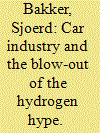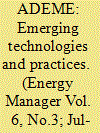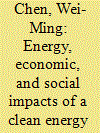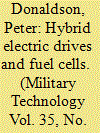|
|
|
Sort Order |
|
|
|
Items / Page
|
|
|
|
|
|
|
| Srl | Item |
| 1 |
ID:
098533


|
|
|
|
|
| Publication |
2010.
|
| Summary/Abstract |
Proton exchange membrane fuel cells (PEM FCs) offer a promising alternative to internal combustion engines in road transport. During the last decade PEM FC research, development and demonstration (RD&D) activities have been steadily increasing worldwide, and targets have been set to begin their commercialisation in road transport by 2015-2020. However, there still is considerable uncertainty on whether these targets will actually be met. The picture is complex and market and technology issues are closely interlinked; investment in RD&D projects is essential but not sufficient; the development of suitable early markets is also necessary and policy is set to play an important role. Auxiliary power units (APUs) are generally regarded as one important early market for FCs in transport. This paper analyses the possible future market for diesel PEM FC APUs onboard long-haul trucks and its implications for the development of PEM FCs in general. The analysis, part of the project HyTRAN (EC Contract no. 502577), is aided by the use of a dynamic simulation model of technology and markets developed by the author. Results suggest that an interesting window of opportunity for diesel PEM FC APUs exists but this is subject to additional research particularly targeted at the rapid development of fuel processors.
|
|
|
|
|
|
|
|
|
|
|
|
|
|
|
|
| 2 |
ID:
099230


|
|
|
|
|
| Publication |
2010.
|
| Summary/Abstract |
The hydrogen hype of the last decade has passed and it is now seemingly substituted by the electric vehicle hype. A technological hype can have both positive as well as negative consequences. On the one hand it attracts sponsors for technology development but on the other hand the high expectations might result in disappointment and subsequent withdrawal of the sponsors. In this paper I ask the question to what extent the car industry has created the hype and how it has done so. The industry's role is studied through their prototyping activities and accompanying statements on market entry. I conclude that the car industry has indeed inflated the hype, especially through its public statements on market release after the turn of the millennium. Furthermore, it can be concluded that the industry has shown a double repertoire of both highly optimistic and more modest statements. It is possible that statements are used deliberately to serve the industry's interests whenever needed. Without neglecting the positive influence of technological hype on public policy and private funding for R&D efforts, more modest promises could serve the development of sustainable mobility better. For policy makers the challenge is to remain open to different options instead of following hypes and disappointments as they come and go.
|
|
|
|
|
|
|
|
|
|
|
|
|
|
|
|
| 3 |
ID:
128724


|
|
|
| 4 |
ID:
176872


|
|
|
|
|
| Summary/Abstract |
Clean energy-related economic policy is designed to promote new energy technology and vigorous economic development. However, this type of policy is typically implemented and evaluated separately in the economic and energy sectors: comprehensive assessments are rarely done. This study analyzes the policy effectiveness of a clean energy-related economic policy in Delaware from energy, economic, and social perspectives.
|
|
|
|
|
|
|
|
|
|
|
|
|
|
|
|
| 5 |
ID:
105101


|
|
|
| 6 |
ID:
098531


|
|
|
|
|
| Publication |
2010.
|
| Summary/Abstract |
It is now widely recognized that effective communication and demand-side policies for alternative energy require sound knowledge of preferences and determinants of demand of the public and consumers. To date, public attitudes towards new transport technologies have been studied under very different conceptual frameworks. This paper gives an overview of the various conceptual frameworks and methodologies used, where four main approaches can be distinguished: general attitudinal surveys, risk perception studies, non-market economic valuation studies, and other approaches such as those based on semiotic theory. We then review the findings of the recent literature on acceptance, attitudes and preferences for hydrogen and fuel cell end-use technologies, focusing on vehicles. These studies are then contrasted with related research into alternative fuel vehicles. The paper finally discusses the main trends in research and avenues for further work in this field. We recommend, among other things, the use of approaches that build knowledge and familiarity with the technology prior to the exploration of attitudes, and the set up of studies that take a whole-systems perspective of hydrogen technologies and that look at hydrogen in the context of other competing clean technologies.
|
|
|
|
|
|
|
|
|
|
|
|
|
|
|
|
| 7 |
ID:
128718


|
|
|
| 8 |
ID:
183561


|
|
|
|
|
| Summary/Abstract |
As a developing country, the Philippines must balance its rapid industrialization efforts with the realities and consequences of climate change on the country. A feasible option to achieve this is increasing the share of renewables in power generation coupled with energy storage technology. This paper examines the present situation and opportunities for development of hydrogen and fuel cell technology in the Philippines as promising alternatives with proven applications in niche energy demand sectors aside from renewables integration. Although the Philippines is considered a latecomer, there is significant renewable resource potential, available local experts and trained talents, and enabling legislations in the country that provide opportunities in harnessing fuel cell technologies for the transition to energy self-sufficient and low-carbon society. Current advancement of the technology in the country is limited to an initial 5-year roadmap, focused on component development from cheap and local materials. Provisions for large-scale hydrogen infrastructure have not yet been realized, which is comparable to the early stages of development in other countries that are also pursuing fuel cell technology. Strong industry-academe partnerships should be pursued through a specific legislated agency to ensure future development of this technology for the country's benefit. Lastly, applications in distributed power generation poised to be a lucrative direction, as demonstration and validation with other potential uses such as transportation remains a challenge.
|
|
|
|
|
|
|
|
|
|
|
|
|
|
|
|
| 9 |
ID:
094908


|
|
|
|
|
| Publication |
2010.
|
| Summary/Abstract |
This article documents that the hydrogen economy continues to attract significant attention among politicians, the media, and some academics. We believe that an explanation lies in the way that the hydrogen economy fulfills psychological and cultural needs related to a future world where energy is abundant, cheap, and pollution-free, a "fantasy" that manifests itself with the idea that society can continue to operate without limits imposed by population growth and the destruction of the environment. The article begins by explaining its research methodology consisting of two literature reviews, research interviews of energy experts, and the application of symbolic convergence theory, a general communications theory about the construction of rhetorical fantasies. We then identify a host of socio-technical challenges to explain why the creation of a hydrogen economy would present immense (and possibly intractable) obstacles, an argument supplemented by our research interviews. Next, we employ symbolic convergence theory to identify five prevalent fantasy themes and rhetorical visions-independence, patriotism, progress, democratization, and inevitability-in academic and public discussions in favor of the hydrogen economy. We conclude by offering implications for scholarship relating to energy policy more broadly.
|
|
|
|
|
|
|
|
|
|
|
|
|
|
|
|
|
|
|
|
|